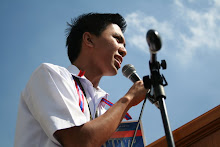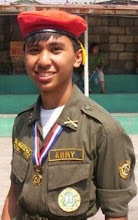Manuel A. Rodriguez II
Cyberspace, as the fifth common domain – after
land, sea, air and outer space, is in great need for coordination, cooperation
and legal measures among all nations. A cyberspace treaty or a set of treaties
at the United Nations level, counting cybersecurity, cybercrime and other cyber
hazards, should be the framework for peace, justice and security in the electronic
world (Schjolberg & Helie, 2011).
Crimes against peace and security in cyberspace
should be established as crimes under international law through a Convention or
Protocol at the United Nations level for mankind will in the future be completely
dependent on information and communication technologies (Ibid).
With the fast changing innovation of technology
is new conduct developed among individuals. Good or bad, these forms of
conduct, however, must be classified so as to determine those which are
gradually destroying our aim for a better environment (Jalayajay & Garcia,
2011).
Serious crimes in cyberspace should be
established under international law, whether or not they are punishable under
national law (Id.). The main purpose of enacting a law is to govern the conduct
of individuals, and to regulate it so as to promote social order. Any conduct,
which seems to be in violation of a person’s right must be governed and
regulated by a law (ibid).
The Dawn of the
Controversial RA 10175
Last September 12, 2012, Philippine President
Benigno Simeon Aquino III signed the Republic Act 10175 (RA 10175) or The Cybercrime
Prevention Act of 2012 into law to prevent various electronic offenses
including forgery, fraud, and identity theft and child pornography. The new
crimes are grouped into two sections in the new RA 10175: Internet Crimes and
Commercial Crimes. Another new crime created under the new law is “Cyber-Squatting”
which is “the acquisition of a person’s domain name in bad faith to profit,
mislead, destroy the reputation and deprive others from registering the same.”
On October 3, 2012 the day one of the effectivity
of the controversial law, the Philippine Government faced a bombardment of
protests. Major news outlets, bloggers, human rights advocates and other
critics turned their social media profile black to express their dismay to the
Government and indignation on the said piece of legislation.
The Philippines has
one of Asia's most effervescent democracies. But critics say the law echoes strategy
to quiet and keep an eye on critics used by former strongman President
Ferdinand Marcos when he imposed martial law in the 1970s (Macaraig, 2012).
Orwellian
Society Philippines?
"Orwellian" is an
adjective describing the situation, idea, or societal condition that George
Orwell identified
as being destructive to the welfare of a free and open society. It connotes an
attitude and a policy of control by propaganda, surveillance, misinformation,
denial of truth, and manipulation of the past, including the
"unperson" — a person whose past existence is expunged from the
public record and memory, practiced by modern repressive governments. Often, this
includes the circumstances depicted in Orwell’s novels particularly in
the award winning novel, Nineteen-eighty-four (Wikipedia.com).
The most
common sense of an “Orwellian” society is the state of complete control of the
Government over its subjects, wherein improper thoughts against the Government is
a serious crime.
The dawn of the Cybercrime Prevention
Act may have brought to us an online version of an “Orwellian” Philippines.
Such a kind of legislation must and should be abhorred for being contrary to
the Due Process Clause enshrined on our Constitution, however, declaring a law
as unconstitutional is a power vested only in one Supreme Court. As opined by
United States Supreme Court Magistrate, Evans Hughes: “Constitution is what the
Judges say it is.”
The Constitution is the guide
which I will never abandon.
-
George Washington
Cybersecurity, Human
Rights, and Civil Liberties
Internet, the network of networks, is an outstanding
way of getting in touch with people and making links. It contributes to the
spread of knowledge, to social and economic development and, if nothing else,
it can be a way of elevating personal life. But it should not be forgotten that
it is also a utensil of power, a place of bazaar where everything can be bought
and sold, including personal data malicious software and crimeware tools
(Schjolberg & Stein, 2011).
Internet can also be considered as an instrument
that allows the development of digital surveillance on a very large scale. This
contributes to potentially threatening several human freedoms: freedom of speech,
freedom of association, freedom of movement (the right to travel and to
navigate freely on the Internet), the right to knowledge and information, and
the right to respect for private life, family and correspondence. In the world
of digital technology, every activity leaves a trace. Cyberspace is billed as being free but people
end up paying for their actions in some way, often payment in kind by providing
their personal data (Ibid.).
Connecting the world in a responsible manner
should guarantee fundamental human rights and civil liberties as well as the
fair and honest handling of personal data. It should help the rethinking of
economic models to ensure that personal data are not just considered as an
asset to be traded.
Finding a realistic balance between the needs
and duties of protection, between the protection of individual and common
interests, between the respect of national sovereignty and the need for
international collaboration, all the while keeping fundamental human rights in
mind, is essential.
It would be reasonable to use these points as a
main axis for development for cybersecurity measures. Both public and private
players should propose technical, legal and economic cybersecurity solutions
which are viable and convincing at national and international levels, in order
to allow the police and justice systems to function efficiently without damaging
fundamental freedoms. It should be kept in mind, however, that no single measure
or security solution can protect against the consequences of injustice (ibid.).
The objective is to offer workable solutions for preserving national
sovereignty as well as managing cybersecurity and the fight against cybercrime
and terrorism, at both a national and an international level. At the same time,
there is a real need to develop measures that foster a fair use of personal
data and digital privacy for everyone (individual, organization and state)
(ibid.).
Cyberspace is not merely virtual; it represents an idea of the world
with a political, and economic and social reality.
Why the
Supreme Court Should Abhor RA 10175
Section 1 of Article III of the Bill of Rights
of the 1987 Constitution provides that 'no person shall be deprived of life,
liberty or property without due process of law, nor shall any person be denied
the equal protection of the laws.'
However, under Section 19 of the Cybercrime
Prevention Act, 'when a computer data is prima
facie found to be in violation of the provisions of this Act, the
Department of Justice (DOJ) shall issue an order to restrict or block access to
such computer.'" No court intervention is needed; the DOJ can go right
ahead and compel you to stop publishing your posts (Sta. Maria, 2012).
It is like police officials breaking inside your home and takes any property of
yours without a warrant issued by a Judge.
The abovementioned
is the strongest reason why the law should be declared unconstitutional. Other
crimes being prohibited by the law as found out by the writer of this article
is reasonable, in fact some crimes in the new law is already prohibited by the
Government prior to the enactment of RA 10175 by other special laws and the
Revised Penal Code. However, the duration of the penalty prescribed in the new
law is not reasonable.
Conclusion
While it may be true that the law has good intentions,
nevertheless the end can never justify the means. The Government exist not only
to protect the people but also to preserve their rights, if one of those two
tasks is left undone then the Government is a failure. Those two tasks are not
options for the Government to perform; they are responsibilities which must be
performed. Protect the people and preserve rights.
The rights of the people do not end in courts,
in the parliament of the streets, or anywhere on Earth. It extends to the
intangible world of social media and on the Internet at large. The web is a
mere extension of our physical world therefore the Constitution remains supreme
therein.
REFERENCES:
Jalayajay, Betsy Rose &
Garcia, Ma. Shiela (2011) DEALING WITH
CYBERCRIMES: The Extent and Application of Current Laws. Far Eastern Law
Review, Vol. XLII, 2011
Macaraig, Meynardo
(2012) Protests as Philippine Cybercrime Law takes
effect. www.gmanetwork.com/news/story/276649/scitech/technology/protect-as-philippine-cybercrime-law-takes-effect
Scjolberg, Stein &
Ghernaouti – Helie, Solange (2011) A Global
Treaty on Cybersecurity and Cybercrime. Cybercrimelaw.net
Sta. Maria, Melencio
(2012) An Interaksyon.com Article. www.gmanetwork.com/news/story/276434/scitech/socialmedia/digital-martial-law-10-scary-things-about-the-cybercrime-prevention-act-of-2012
en.wikipedia.org/wiki/Orwellian
Republic Act 10175. AN ACT DEFINING CYBERCRIME, PROVIDING FOR
THE PREVENTION, INVESTIGATION, SUPRESSION AND THE IMPOSITION OF PENALTIES
THEREFOR AND FOR OTHER PURPOSES. Signed
September 12, 2012. Took effect October 30, 2012





